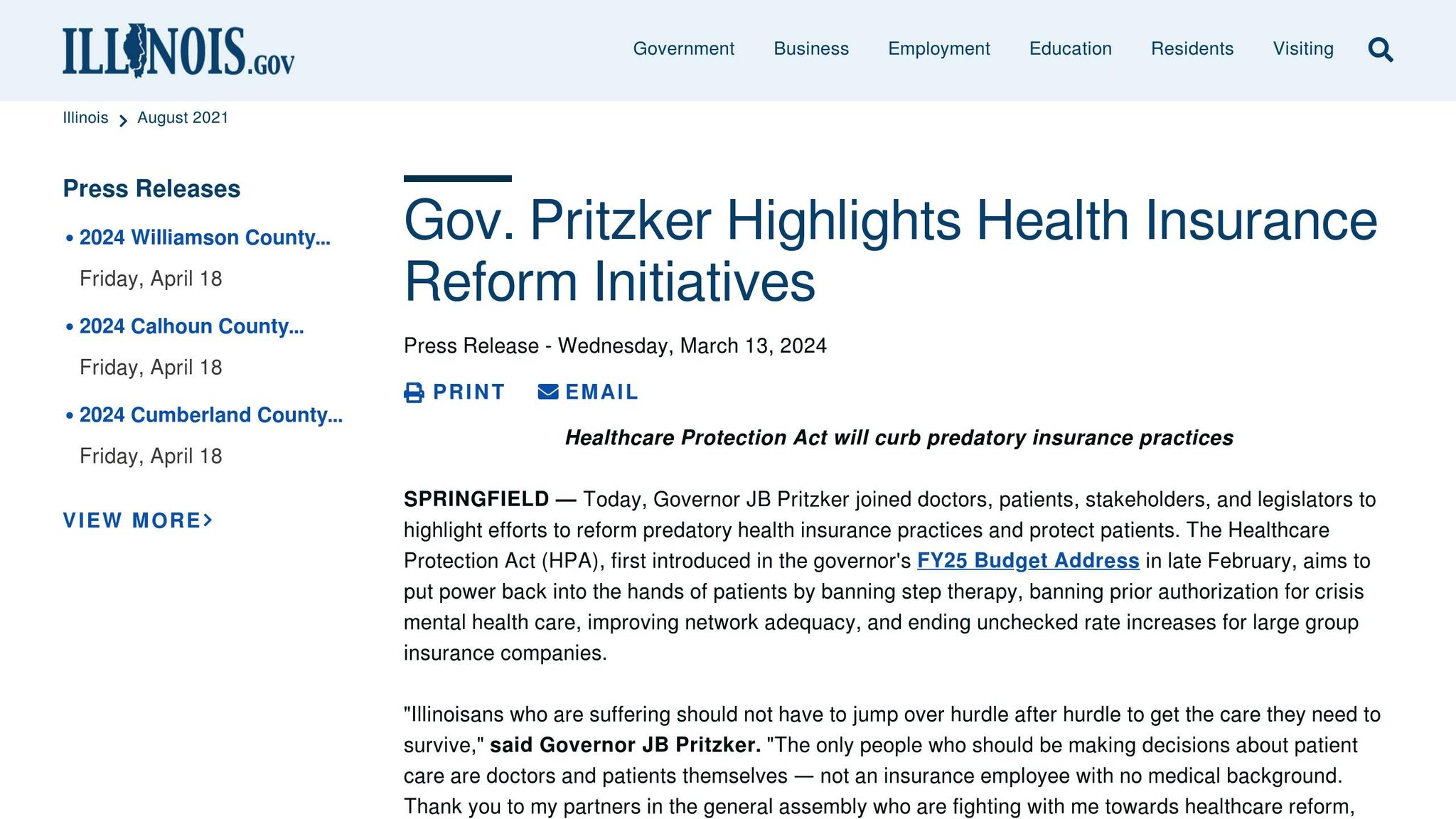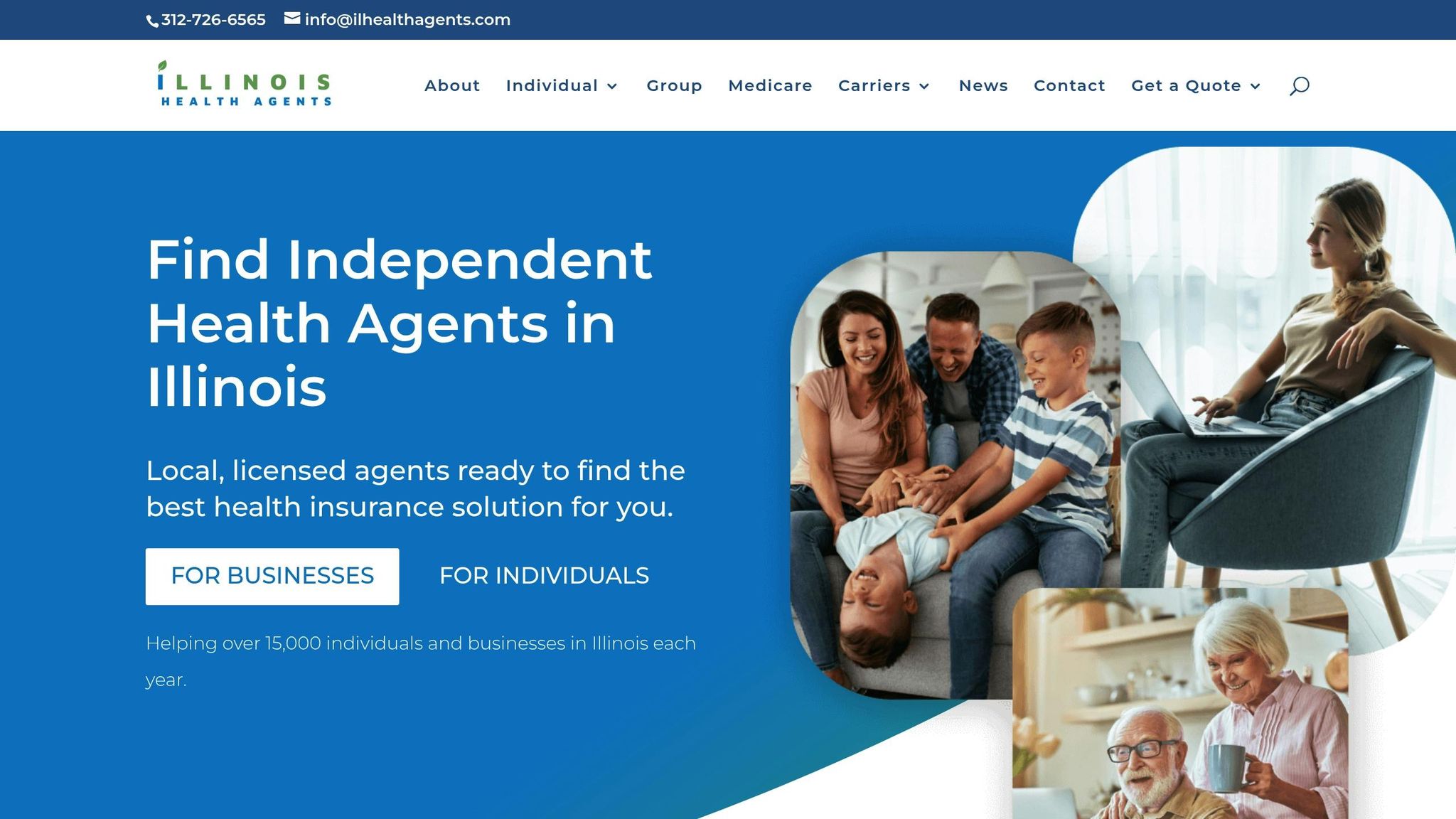The Illinois Prior Authorization Reform Act, effective January 1, 2025, simplifies healthcare approvals in Illinois. It introduces standardized processes, electronic submissions, and strict deadlines for insurers to reduce delays and improve access to medical care.
Key Highlights:
- Fast Decisions: Urgent care approvals in 48 hours, medications in 24 hours.
- Longer Authorizations: Chronic care approvals now last 12 months.
- Transparency: Insurers must publish covered services and criteria online.
- Continuity of Care: Existing authorizations honored for 45 days when switching health plans.
- Less Paperwork: A single electronic platform for all submissions.
These changes aim to streamline healthcare for patients and providers, ensuring faster, more reliable access to treatments.
Healthcare Protection Act becomes law in Illinois, addresses …

Main Requirements of the Reform Act
The Reform Act brings major updates to Illinois’ prior authorization system, setting clear rules and deadlines for health plans across the state. These changes aim to simplify processes and make them more consistent.
Health Plan Disclosure Rules
To address a lack of transparency, insurers are now required to:
- Publish a full list of services that need prior authorization on their websites.
- Share detailed criteria for evaluating authorization requests.
- Notify about updates and provide contact information at least 60 days before changes take effect.
- Identify services eligible for automatic approval based on clinical guidelines.
Decision Time Limits
The Act enforces strict response times for different types of care:
- Urgent care: Decisions must be made within 48 hours, with an option for expedited appeals.
- Non-urgent care: Responses are required within 5 business days, along with written explanations.
- Emergency services: Coverage must be provided immediately without prior authorization.
- Prescription medications: Decisions must be made within 24 hours, with clear reasons for any denial.
Insurers must also ensure 24/7 access to medical reviewers for urgent care cases, so immediate decisions can be made when needed.
Authorization Length and Review Process
New rules govern how long authorizations last and how they are reviewed:
- Approvals for chronic care must cover 12 months.
- Medication authorizations should last for the entire prescribed treatment period.
- Reviewers must be licensed in the specific area of care being evaluated.
- If a patient switches health plans, the new insurer must honor prior authorizations for 45 days.
- Changes to treatment plans require a simplified review process instead of starting over.
These updates are designed to streamline the prior authorization process, reduce paperwork, and improve patient access to timely medical care.
Changes for Healthcare Providers and Patients
Here’s a breakdown of how these reforms improve workflows for healthcare providers and make life easier for patients.
Faster Access to Treatment
New rules require urgent-care decisions within 48 hours and medication approvals in just 24 hours. This means patients can start treatments sooner without unnecessary delays. Emergency departments can now provide immediate care, knowing insurance coverage is guaranteed without needing prior authorization. For providers, this speeds up scheduling procedures and treatments, helping to reduce appointment backlogs and improve care delivery.
Less Paperwork
A standardized electronic submission system replaces the hassle of dealing with different forms and formats for various insurers. Now, healthcare staff can submit a single authorization request that applies to all Illinois health plans. Plus, 12-month approvals for chronic care significantly cut down on reauthorization paperwork. Providers also have access to clear online criteria, making the initial submission process much simpler.
Support for Long-term Care Patients
Patients with chronic conditions no longer need monthly reapprovals, thanks to mandatory 12-month authorization periods. Switching health plans? A 45-day continuation of existing authorizations ensures care isn’t interrupted. For ongoing prescriptions, full-treatment-period authorizations prevent coverage gaps, keeping care plans on track without disruptions.
sbb-itb-a729c26
Following the New Rules
Key Dates and Deadlines
- January 1, 2025: Full switch to the electronic submission system.
- February 1, 2025: Insurers must publish covered services lists on their websites.
- March 1, 2025: Standardized prior authorization forms must be in use.
- Quarterly compliance reports: Due on March 31, June 30, September 30, and December 31.
- Monthly authorization logs: Submit by the 10th of each month.
- Criteria updates: Provide a 60-day advance notice for any changes.
Responsibilities for All Stakeholders
- Use a standardized electronic submission platform.
- Ensure around-the-clock review capabilities for urgent care requests.
- Record all authorization decisions, including the clinical reasoning.
- Introduce automated approval systems for eligible services.
- Set up a clear appeals process for denied authorizations.
- Provide secure provider portals for tracking authorization statuses.
- Update internal policies to match the new timelines.
- Train staff thoroughly on the updated procedures and rules.
Oversight and Penalties
- Conduct monthly audits to ensure response times are met.
- Perform quarterly reviews of denial trends and appeals.
- Fines for violations:
- $1,000 per instance of missed time requirements.
- $5,000 for recurring non-compliance issues.
- Develop corrective action plans for repeat offenses.
- Publish compliance statistics publicly.
- Severe violations may lead to the loss of operating licenses.
- State regulators will conduct annual performance reviews.
- Independent third-party audits may be required for compliance checks.
Providers and insurers must meet these deadlines and follow the outlined rules to streamline authorization processes and enhance patient care. Failure to comply could result in financial penalties and reputational risks.
Before and After the Reform
In earlier sections, we broke down each reform in detail. Here’s a quick comparison of how things have changed:
- Before the Reform:
- Disconnected systems made processes inefficient.
- Approval criteria varied and lacked consistency.
- Short authorization periods caused frequent renewals.
- Limited insight into the status of requests.
- Insurers had different requirements, creating confusion.
- After the Reform:
- A single electronic platform streamlines processes.
- Approval criteria are now standardized.
- Authorizations last for 12 months, reducing renewals.
- Tracking systems provide clear, real-time updates.
- Insurers follow uniform standards statewide.
Next up: Key dates, deadlines, and enforcement details under the Reform Act.
Summary and Resources
Key Takeaways
The Illinois Prior Authorization Reform Act introduces several updates aimed at improving healthcare service approvals. These include standardized electronic submissions, strict response deadlines, longer authorization periods, clear and transparent criteria, and simplified processes. These changes are designed to reduce delays and lessen the administrative load for healthcare providers.
Support from Illinois Health Agents

Illinois Health Agents offers expert assistance to help you navigate these new regulations. Their services include:
- Individual & Family Plans: ACA plans, short-term coverage, Medicare supplements, vision, dental, and life insurance.
- Business Solutions: Employee education, benefits management, and annual plan reviews.
- Compliance Assistance: Help with understanding new authorization requirements.
- Enrollment and Plan Management: Support with enrollment, plan adjustments, and renewals.
For a personalized consultation about your coverage options under the updated prior authorization rules, reach out to Illinois Health Agents today.




0 Comments